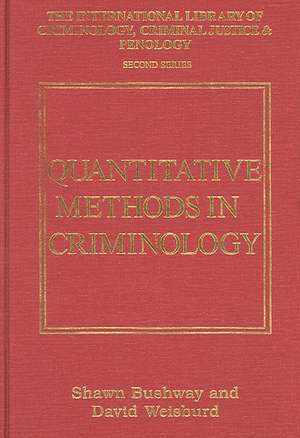Quantitative Methods in Criminology: International Library of Criminology, Criminal Justice and Penology - Second Series
Autor Shawn Bushway Editat de David Weisburden Limba Engleză Hardback – 26 aug 2005
Din seria International Library of Criminology, Criminal Justice and Penology - Second Series
- 31%
 Preț: 1835.38 lei
Preț: 1835.38 lei - 27%
 Preț: 999.23 lei
Preț: 999.23 lei - 31%
 Preț: 1839.55 lei
Preț: 1839.55 lei -
 Preț: 450.79 lei
Preț: 450.79 lei - 25%
 Preț: 1108.80 lei
Preț: 1108.80 lei - 26%
 Preț: 1636.57 lei
Preț: 1636.57 lei - 26%
 Preț: 1638.51 lei
Preț: 1638.51 lei - 31%
 Preț: 1835.22 lei
Preț: 1835.22 lei - 25%
 Preț: 941.40 lei
Preț: 941.40 lei - 31%
 Preț: 1835.30 lei
Preț: 1835.30 lei - 31%
 Preț: 1726.75 lei
Preț: 1726.75 lei - 31%
 Preț: 1698.01 lei
Preț: 1698.01 lei - 26%
 Preț: 1697.82 lei
Preț: 1697.82 lei - 25%
 Preț: 996.69 lei
Preț: 996.69 lei - 23%
 Preț: 442.12 lei
Preț: 442.12 lei - 28%
 Preț: 1643.41 lei
Preț: 1643.41 lei
Preț: 1112.48 lei
Preț vechi: 1563.35 lei
-29% Nou
Puncte Express: 1669
Preț estimativ în valută:
212.88€ • 227.64$ • 177.49£
212.88€ • 227.64$ • 177.49£
Comandă specială
Livrare economică 28 martie-11 aprilie
Doresc să fiu notificat când acest titlu va fi disponibil:
Se trimite...
Preluare comenzi: 021 569.72.76
Specificații
ISBN-13: 9780754624462
ISBN-10: 0754624463
Pagini: 638
Dimensiuni: 169 x 244 x 49 mm
Greutate: 1.25 kg
Ediția:1
Editura: Taylor & Francis
Colecția Routledge
Seria International Library of Criminology, Criminal Justice and Penology - Second Series
Locul publicării:Oxford, United Kingdom
ISBN-10: 0754624463
Pagini: 638
Dimensiuni: 169 x 244 x 49 mm
Greutate: 1.25 kg
Ediția:1
Editura: Taylor & Francis
Colecția Routledge
Seria International Library of Criminology, Criminal Justice and Penology - Second Series
Locul publicării:Oxford, United Kingdom
Cuprins
Contents: Introduction. Research Design and Study Outcomes: The specific deterrent effects of arrest for domestic assault, Lawrence W. Sherman and Richard A. Berk; A randomized experiment testing inmate classification systems, Richard A. Berk, Heather Ladd, Heidi Graziano and Jong-Ho Baek; Does research design affect study outcomes in criminal justice?, David Weisburd, Cynthia M. Lum and Anthony Petrosino; The efficacy of psychological, educational and behavioral treatment: confirmation from meta-analysis, Mark W. Lipsey and David B. Wilson. Quantitative Issues in Sampling: Missing data problems in criminological research: 2 case studies, Robert Brame and Raymond Paternoster; Design sensitivity in criminal justice experiments, David Weisburd, Anthony Petrosino and Gail Mason; Formal processing and future delinquency: deviance amplification as selection artifact, Douglas A. Smith and Raymond Paternoster. Issues in Measurement: A note on the use of official statistics, John I. Kitsuse and Aaron V. Cicourel; On exploring the 'dark figure' of crime, Albert D. Biderman and Albert J. Reiss Jr ; Rap sheets in criminological research: considerations and caveats, Michael R. Geerken; An experimental comparison of 2 self-report methods for measuring lambda, Julie Horney and Ineke Haen Marshall; The age-crime debate: assessing the limits of longitudinal self-report data, Janet L. Lauritsen; Self-reported delinquency and a combined delinquency seriousness scale based on boys, mothers and teachers: concurrent and predictive validity for African Americans and Caucasians, David P. Farrington, Rolf Loeber, Magda Stouthamer-Loeber, Welmoet B. van Kammen and Laura Schmidt. Descriptive Analysis of Quantitative Data: Visualizing homicide: a research note, Michael D. Maltz; The (un)known universe: mapping gangs and gang violence in Boston, David M. Kennedy, Anthony A. Braga and Anne M. Piehl; A prospective test of a criminal career model, Arnold Barnett, Alfred Blumstein and David P. Farrington; Micro-models of criminal careers: a synthesis of the criminal careers and life course approaches via semiparametric mixed poisson models with empirical applications, Kenneth C. Land and Daniel S. Nagin; Desistance as a developmental process: a comparison of static and dynamic approaches, Shawn D. Bushway, Terrence P. Thornberry and Marvin D. Krohn; Trajectories of crime at places: a longitudinal study of street segments in the city of Seattle, David Weisburd, Shawn Bushway, Cynthia Lum and Sue-Ming Yang. Causal Modeling: Measuring positive externalities from unobservable victim precaution: an empirical analysis of Lojack, Ian Ayres and Steven D. Levitt; A comparative study of the preventative effects of mandatory sentencing laws for gun crimes, David McDowall, Colin Loftin and Brian Wiersema; Time series analysis of crime rates, David F. Greenberg; Poisson-based regression analysis of aggregate crime rates, D. Wayne Osgood; Name index.
Notă biografică
Shawn Bushway is Professor in the School of Criminal Justice, State University of New York at Albany, USA. David Weisburd is from the Institute of Criminology at The Hebrew University of Jerusalem, Israel and the Department of Criminology and Criminal Justice, University of Maryland, USA.
Recenzii
'...a consolidated collection of sophisticated treatments of criminological research problems...of use to researchers, instructors and students...' Psychology Teaching Review
Descriere
This informative reference volume features the key papers in the growing field of quantitative criminology. Divided into five parts: research design, sampling, issues in measurement, descriptive analysis and causal analysis, it will be of interest to anyone concerned with criminology and criminal justice, as well as those with specialized interests in quantitative methods.
